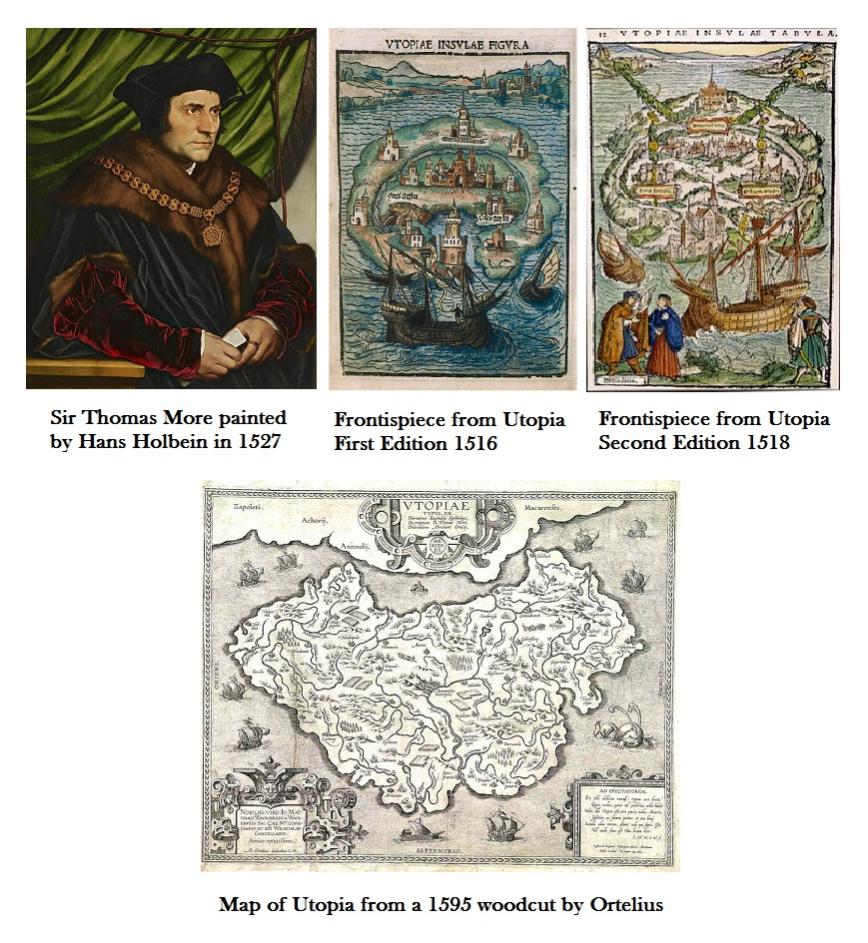THE ROAD TO UTOPIA – A BRIEF GUIDE TO SIR THOMAS MORE’S MASTERPIECE
This year marks the 500th anniversary of the publication of Utopia, Thomas More’s allegory on the ideal society. Written in two books, the first volume describes the author’s meeting with Raphael, an explorer who supposedly journeyed to the New World with Amerigo Vespucci in 1507. Raphael and More discuss the failings of Europe’s monarchs, such as their fondness for waging war and executing their citizens, before the sailor reveals he has discovered the perfect civilisation on an island in the Atlantic. Book II describes how these ‘Utopians’ live in peace and harmony:
1. Utopians practice four religions: moon-worship, sun-worship, planet-worship, ancestor-worship and monotheism. Each religion tolerates the others but atheists are despised because those who refuse to believe in divine punishment or reward after death have no reason to take part in the island’s communal life and will break the laws for their own gain.
2. Though wives are subject to their husbands, and husbands are subject to their wives, women must confess their sins to their husbands once a month. Female occupations are restricted to those connected to running the household but widows may become priests.
3. While all citizens receive military training, Utopians rarely go war. If their allies are attacked, they send military aid but Utopia’s soldiers try to capture their enemies alive and are upset if victory is won through bloodshed.
4. People are regularly redistributed around households and towns to keep numbers even. If the island becomes overpopulated, colonies are established on the mainland and the natives invited to join them. Conversely, if the island is underpopulated, the colonists are recalled.
5. As all laws are simple everyone can understand them and there is no need for lawyers. Gambling, hunting, makeup and astrology are discouraged and privacy is not regarded as a freedom. Taverns, inns and places for private gatherings are banned and, because this keeps everyone in full view of their fellows, everyone is obliged to behave properly.
6. All goods are stored in communal warehouses and people simply take what they need when they need it. As there is no private property, there are no locks on Utopian doors and the houses are rotated between the citizens every ten years to avoid jealousy.
7. Agriculture is the most important job on the island and every person, both male and female, must live and work as a farmer for at least two years. Meals are taken in communal dining halls and the job of feeding the population is given to a different household in turn.
8. In addition to taking their turn in the fields all citizens must practise a trade. Because everyone must work, there is no unemployment and the length of the working day is just six hours. Scholars, identified during their schooling for their ability to learn, become the islands rulers, officials and priests but all citizens are encouraged to continue with their education.
9. Curiously Utopia is slave-owning society but the island’s slaves are prisoners of war or domestic criminals. Slaves wear chains made of gold and this, combined with using the precious metal for odious objects such as chamber pots, discourages greed for wealth. Similarly, everyone wears identical clothing and jewels are regarded as toys for children.
10. Utopians cannot travel, even around the island, without a passport and, whilst health care is provided free, euthanasia is regularly practised. Adultery is also forbidden and anyone who breaks either of these laws is enslaved however slaves can earn their freedom through good behaviour.
More’s Utopia, along with Plato’s Republic, has inspired numerous Utopian visionaries over the centuries, yet those who aspire to create such an ideal society in real life should remember that the word ‘Utopia’ is a deliberate pun. in Greek ‘topos’ means place but the ‘u’ sound can mean both ‘good’ (eu) and ‘no’ (ou), so Utopia can mean ‘a good place’ or ‘nowhere’.
One interpretation for this wordplay is that the highly religious More is saying that a perfect society can only be found in heaven, not on earth, and the author even apologises for not recording Utopia’s precise location. This omission, More explains, was due to someone coughing when Raphael revealed Utopia’s exact latitude and longitude!
